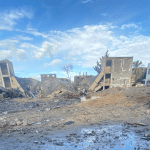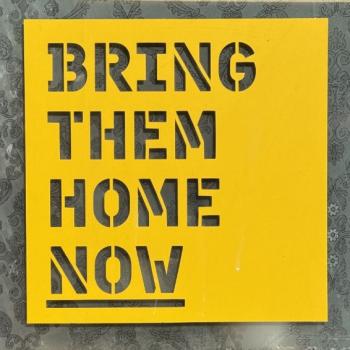Israel has always boasted of having the “most moral army in the world” and practicing “purity of arms.”
“What other army,” we croon, “has the benevolence to drop leaflets on the enemy population and tell them to leave before an attack? What other army creates an app that warns the enemy to evacuate, block by block? What other army calls for humanitarian corridors, and stops fighting to let the enemy pass by?”
Let’s pretend for a minute that those leaflets have bus tickets to Rafah printed on the back, and the evacuation app provides a QR code for a free bus ride to Rafah (and the app works because the internet connection works).
Let’s pretend that Gaza is full of buses, fueled up and ready to drive – and they’re handicapped accessible and child friendly – and the evacuation route is a smooth paved highway and the route is not full of snipers that kill people and checkpoints that disappear people.
Let’s pretend that when those buses reach Rafah, they find it lined with temporary housing, plenty of porta potties, soup kitchens, first aid facilities, fresh water, and accommodations for children to attend school. There are hospitals for the thousands of patients who had been evacuated from northern Gaza hospitals, for all the pregnant women to give birth safely, and for all the children to get their routine checkups and vaccinations.
And so, with all two million plus Palestinian civilians tucked safely and comfortably away in Rafah, Israel’s military can engage the Hamas fighters all over the rest of Gaza.
May the best army win.
But that’s all make-believe.
In reality of course, those leaflets and apps merely order Gazans to leave within six hours or 24 hours, or some other unreasonably short period of time – but do not tell them how to get to the next location, or how long they should expect to be gone, or how they will survive. (Mind you, the app does not work in a communications blackout – often the deadliest attacks have taken place under Israeli-imposed blackouts.) Some people have vehicles, some have bicycles, some have only their legs. Some don’t even have that, and have to be pushed in wheelchairs. The evacuation route, a major north-south road called Salahaddin Street, is full of craters and debris from Israeli bombardment.
Along the main evacuation route, people are instructed to look straight ahead only. There is to be no stopping or talking. Tanks line the road; behind them loom bombed-out buildings. Dead bodies litter the street – people who disobeyed an order or succumbed to heat stroke or dehydration.
At one checkpoint, the men are separated from their families, and some are never seen again (or in some cases, until they appeared on social media in their underwear). Some return in a short (or short-ish) time, but without their clothes, or their wallets, or their identification papers. Israeli soldiers bark orders, degrade, kick and threaten, and shoot off their weapons.
At some point, only foot traffic is allowed to continue; cars, donkeys, horse trailers must be abandoned, and evacuees continue walking, carrying whatever they can.
On more than one occasion, Israeli warplanes have simply bombed the people as they trek south – in one incident, killing at least 70 evacuees who were foolish enough to believe the route Israel said was “safe” really was safe. Others were instructed where to go for safety, but when they arrived, they were bombed. The stuff of nightmares for everyone still traveling, and everyone who dares to think they’re safe.
Those who make it to Rafah don’t find temporary housing or health care. Some aid agencies hand out pots full of thin lentil soup, or rice, or bread – to those lucky (or aggressive) enough to reach the front of the line before it’s all gone.
Some people who are lucky or aggressive enough manage to secure a free tent from a humanitarian aid handout, or a blanket, or a bit of canned food. Sometimes there are sacks of flour available for making flatbread on makeshift open air griddles.
Those not lucky enough or aggressive enough must pay exorbitant amounts for the most basic items – if they can find them. Parents go days without a bite so their children can eat; when mother’s milk has dried up and formula can’t be found, babies are given solid food – though it makes them sice; people have turned to eating grass, animal fodder; everyone drinks whatever water they can find.
But as more and more areas of Gaza are slated for evacuation, Rafah becomes unbelievably overcrowded. Between the cold, rainy weather, the leaky or drafty tents, the contaminated water, unpalatable (or nonexistent) food, and crowded quarters, illnesses are rampant and spreading – most commonly, diarrhea. But there are few bathrooms (one for every 220 people, according to the World Health Organization). The word “grim” comes to mind.
Rafah does have a couple of hospitals, but like the rest of Gaza’s hospitals, these are woefully overcrowded and undersupplied. There are not enough beds, or doctors, or even anesthesia, painkillers, or bandages to go around.
Throughout the Strip, surgeries are often performed on the floor, by the light of an iPhone (electricity was shut off back in October; solar panels and sometimes generators are the only sources of power). Amputations – amputations – are performed without anesthesia – the stuff of more nightmares.
As for schools, there are none. School buildings that haven’t been reduced to rubble have been turned into shelters – and many children spend their days searching for firewood or standing in line for handouts anyway.
Up to 1.8 million people are trying to survive in and around Rafah like this. That means hundreds of thousands are still in other parts of Gaza. Some have decided they would rather die quickly in their homes from a bomb than slowly from disease or starvation. Some simply can’t make the trip for health reasons.
Some refuse to leave again, as they did in 1948, in the Nakba. Their memory of those days is clear: Israeli soldiers told them to evacuate their villages for a few days – just leave everything, it will be right where you left it when you return. But it was a trick. They were never allowed to return. They won’t be tricked again.
But they have been tricked again. When Israel called for evacuation, it was made clear that those who stayed would be considered “participants in the hostilities” or “voluntary human shields.” They can stay where they are, but at the risk of their lives.
So while many around the world look in horror at the ever-rising death toll, Israel’s leaders can sleep at night, in the knowledge that they have plausible deniability. “We told them to leave. It’s not our fault if they ignored us.” “We didn’t want to kill civilians. They made us do it.”
Yes, indeed. Israel’s hands really are clean. It really is the most moral army in the world.
I invite you to subscribe to my newsletter. I write about the Palestine-Israel issue regularly, and other issues relevant to progressives or those considering becoming progressive. If you would like to comment on this post, please pop over to my Facebook page. All of my posts are there and open to constructive comment. I welcome your thoughts.
If you don’t like what Israel is doing in Gaza, contact the people in Washington DC who (allegedly) work for you and tell them,
“ENOUGH. CEASEFIRE NOW. NO MORE WEAPONS TO ISRAEL. STOP THE GENOCIDE. NOW – OR YOU’RE FIRED.”
Reach your Representative here, and your Senator here. Email President Biden here.
READ MORE ABOUT PALESTINE:
Posts about my Gazan family (in chronological order):
- Follow this refugee family’s quest for survival in Gaza
- The hardest decision our family in Gaza has ever made
- The unexpected one-word message coming out of Gaza today
- The new normal: eating during a famine in Gaza
- The truth about Gaza: “I swear, we don’t mind death”
- The reality of survival in Gaza, on Spiritual Brewpub
- 3 funerals and a wedding in Gaza
- “We’re surrounded. Israelis are everywhere. We are dying.”
- “We were surrounded by tanks. It’s a miracle we got out.”
Further reading on the Palestine-Israel issue:
- Western “civilization” exposed for its colossal ruthlessness
- To Biden, Palestinian genocide is already complete
- The lies we believe about Gazan Christians are killing them
- Can followers of the Prince of Peace support a group that uses violence?
- Why support for Palestinian resistance is the right response for Christians
- This thought experiment will make you smarter about Gaza and Israel
- A Palestinian Pastor’s powerful message to us: “it’s time to stop praying”
- Christians: Why do we skimp on compassion when it comes to Palestinians?
- Don’t compromise truth on Israel and Palestine
- What People Of Faith Need To Know About Gaza And Israel Right Now
FEATURED IMAGE: by Dan Meyers via UnSplash














